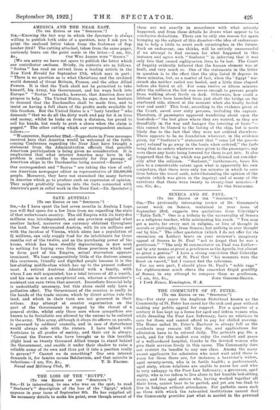THE LOSS OF THE 'EGYPT.'
[To THE EDITOR OF THE "SPECTATOR."] SIR,—It is interesting, to one who was on the spot, to read "
Seafarer's" description of the loss of the 'Egypt,' which appears in your issue of September 9th. He has supplied all Ike necessary details to make his point, even though several of them are not exactly in accordance with what actually happened, and from these details he draws what appear to be conclusive deductions. There can be only one reason for again bringing up the subject of this disaster—the idea of endeavour- ing to help a little to avert such catastrophes in the future. Such an endeavour, one thinks, will be entirely unsuccessful if we attempt to find excuses for what happened in this instance and agree with " Seafarer " in inferring that it was only fate that caused eighty-seven lives to be lost. The Court of Inquiry evidently believed that the human element was at fault, and very much so. One of the statements in the letter in question is to the effect that the ship listed 30 degrees in three minutes, but, as a matter of fact, when the ` Egypt ' was struck she neither reeled nor heeled, and a little time elapsed before she listed at all. For some twelve or fifteen minutes after the collision the list was never enough to prevent people from walking about freely on dock. Otherwise, how could a lifeboat have been launched from just abaft the bridge on the starboard side, almost at the moment when she finally heeled over and sank? This boat, according to the evidence given at the Court, saved over sixty persons, including the captain. Therefore, if passengers appeared wandering about upon the boat-deck—" the last place where they are wanted, as they are dreadfully in the way and hamper the lowering of boats "- this cannot be blamed to the listing of the ship, but is more likely due to the fact that they were not ordered elsewhere. There appears to be no foundation whatever, in the evidence given, for " Seafarer's " statement that "some [of the passen- gers] refused to go away in the boats when ordered," the facts being that no orders whatever were given to the passengers, nor were there any boats being lowered for them to get inte. It also happened that the fog, which was patchy, thinned out consider- ably after the collision. 'Seafarer," furthermore, bases his plea to a considerable extent upon what is apparently his own conjecture, that there were only ten minutes in which to save lives before the vessel sank, notwithstanding the opinion of the captain (which was given in the inquiry) and of many of the survivors that there were twenty to twenty-four minutes.—I


































 Previous page
Previous page